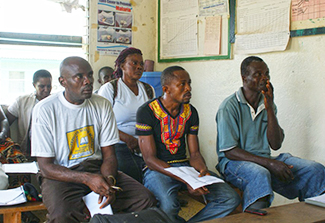Addressing mental health abroad helps US communities
November / December 2022 | Volume 21 Number 6
 Photo courtesy of WHO/Alison BrunierCommunity-based training, such as this session in Sinoe County, Liberia, provides health practitioners with the skills to be able to recognize symptoms of mental illness.
Photo courtesy of WHO/Alison BrunierCommunity-based training, such as this session in Sinoe County, Liberia, provides health practitioners with the skills to be able to recognize symptoms of mental illness.
As the U.S. population becomes increasingly diverse, it is more important than ever to ensure that providers can serve their patients in a culturally responsive way. A recent
educational case report published in
Academic Psychiatry highlights how global collaborations in mental health research can help providers better reach underserved communities in the United States.
The report came from a study co-funded by Fogarty and the National Institute for Mental Health (NIMH). Authors Dr. Kristina Korte, Assistant Professor of Psychology at Harvard Medical School and Clinical Psychologist at Massachusetts General Hospital, and Dr. Kimberly Hook, Research Fellow at Harvard T.H. Chan School of Public Health, described a long-standing program led by senior author Dr. David Henderson, Chief of Psychiatry at the Boston University School of Medicine. He and his colleagues supported the Liberian Ministry of Health in developing that nation's first mental health strategic plan. They surveyed Liberians to better understand mental health needs, specifically focusing on children and adolescents and patterns of substance abuse associated with mental illness.
While in the U.S., the team enlisted the help of the Liberian immigrant community in Massachusetts through a local church congregation. These volunteers helped translate and transcribe the survey results from Liberia to ensure researchers captured linguistic nuances and cultural differences they might have otherwise missed. With the volunteers' input, researchers could identify inefficiencies, restructure their initial survey, and develop a more culturally relevant questionnaire for future study participants in Liberia. The volunteers who helped the researchers also recognized similar mental health issues in their community in the U.S. One church member was quoted as saying, "Even though we are here in America, we are still the same Africans. We still have the same beliefs. We still handle mental and emotional health issues the same way."
Ultimately the project not only supported Liberia's Mental Health Policy and Strategic Plan, but in Massachusetts, the Health and Mental Health Education and Awareness for Africans in Lowell or HEAAL initiative was established between the church and the Department of Psychiatry at Boston University School of Medicine with the goal of better understanding the nature, characteristics, scope, and magnitude of health and mental health issues in this faith community of primarily immigrants and refugees.
While this global-local paradigm has clear positive implications for the patient population, this work also creates new training opportunities for mental health professionals in U.S. and global settings. As trainees work with diverse populations through global-local collaboration or community engagement, their cultural competency and humility grows, enabling providers to address potential cultural barriers to care. With the growing recognition of mental health as a global issue, it is increasingly important to help bridge the gap and provide culturally responsive care for the diverse communities of the U.S. The report notes that while this study focused on Liberia, the lessons learned can be implemented in other low- and middle-income countries and their respective diaspora communities in the West.
More Information
Updated December 15, 2022
To view Adobe PDF files,
download current, free accessible plug-ins from Adobe's website.
Related Fogarty Programs
Related World Regions / Countries
Related Global Health Research Topics